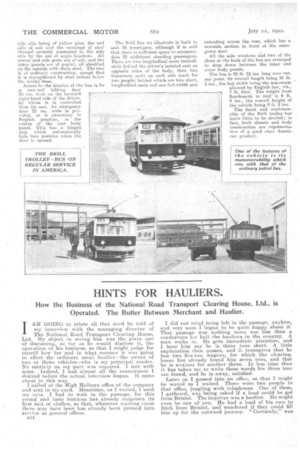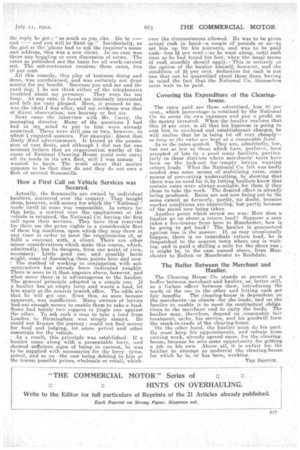HINTS FOR HAULIERS.
Page 12

Page 13

If you've noticed an error in this article please click here to report it so we can fix it.
How the Business of the National Road Transport Clearing House, Ltd., is Operated. The Buffer Between Merchant and Haulier.
IAM GOING to relate all that need be told of my interview with the managing director of The National Road Transport Clearing House, Ltd. My object in seeing him was the plain one of discussing, so far as he would disclose it, the operation of his business, so that I might judge for myself how far and in what manner it was going to affect the ordinary small haulier—the owner of two or three vehicles—who is my principal reader. No subtlety on my part was required. I met with none. Indeed, I had almost all the reassurance I desired before the actual interview began. It came about in this way. I called at the High Holborn office of the company and sent in my card. Meantime as I waited, I used my eyes. I had to wait in the passage, for this young and lusty business has already outgrown its first suit of clothes, so that,. whatever waiting loom there may have been has already been pressed into service as general offices. I did not mind being left in the passage, anyhow, and very soon I 'began to he quite happy. about it. That passage was nothing more nor less than a rendezvous for half the hauliers in the country. A man walks in. He gets immediate attention, and 1 hear him say he is three tons short. A little explanation then passes, and it transpires that he has two five-ton wagons, forwhich the clearing. .house has already found him seven tons, and that he is anxious for another three. In less time than it has taken me towrite these words his three tons are found, and he is away, satisfied.
Later on I passed into an office, so that I might be seated as I waited. There were two people in that office, juggling with telephones. One of them, I gathered, was being asked if a load could be got from Bristol. The inquirer was a haulier. He might even be one of you. He had a load of his own to fetch from Bristol, and wondered if they could fill him up for the outward journey. "Certainly," was the reply he got ; " as much as you iike. Go to
and — and you will be fixed up." Incidentally, as the girl at the 'phone had to ask the inquirer's name and address, this was a new client. In no case was there any haggling or even discussion of terms. The rates as published arethe basis for all work; carried out. The sub-contractor receives those, rates, less 10 per cent.
All this comedy, this play of business doing and done, was unrehearsed, and was certainly not done merely for my benefit. Between you and me and the yard dog, I do not think either of the telephonists troubled about my presence. They were far too busy. At any rate, it found me intensely interested and left me very pleased. Here, it seemed to me, was the ideal I was after, and my evidence was that of direct observation, not hearsay or hot air. Next came the interview with Mr. Carey, the managing director. Many of the questions I had had in my mind to put to him were already answered. There were still one or two, however, to which I required answers. For example: About that Daily Mail advertisement. It hintedsat the possession of vast fleets, and although I did not for one moment believe that an organization worthy of the name of National Clearing House could ever carry all its loads in its own fleet, still I was uneasy. I wanted to know. The truth about that matter appears to be that they do and they do not own a fleet of several Scamnaells.
How a First Call on Vehicle Services was Secured.
Actually, the Seammells are owned by individual hauliers, scattered over the country. They bonght them, however, with money for which the "National" _made itself in some way responsible. In return for this help, a control over the employmentof the vehicle is retained, the National Co. having the first call upon their services. They have thus reserved for their use the prior rights to a considerable fleet of these big machines,. upon which they may draw at any time in order to meet the requirements of, er fulfil a contract with, a client. There are other minor eonsiderations which make this course, which, admittedly, has its dangers, from our point of view, necessary. Little good can, and, possibly harm might, come of discussing those points here and now. The method of working in conjunction with subcontractors has already been indicated roughly. There is more in it than appears above, however, and what more there is is advantageous to the haulier. The general principle adopted is a simple one. If a haulier has an empty lorry and wants a load, la him apply at the nearest branch office. The odds are that he will get one. even this, as soon became apparent, was insufficient. Many owners of lorries had not enough money to enable them to take a load. Some had barely two coppers to jingle one against the other. To ask such a man to take a load from London to Birmingham was simply absurd. He could not finance the journey z could not find money for food and lodging, let alone petrol and other essentials for the vehicle.
As a result, this principle was established. If a haulier came along with a presentable lorry, and showed sufficient signs of being in earnest, he was to be supplied with necessaries for the lorrytyres, petrol, and so on—the cost being debited to him at the lowest possible prices, wholesale or retail, which
ever the circumstances allowed. He was to be given actual cash in hand—a couple of pounds or so—to set him up for his journeys, and was to be paid cash—less 2-i per. cent —as he went along, until suchtime as he had found his feet,. when the usual terms of cash Monthly should apply. This is entirely at the option of the haulier himself, -however, and the condition of 2Aper cent, deduction for cash is not one that can be quarrelled about these days, having in mind the -fact that the National Co. themselves must wait to be paid.
Covering the Expenditure of the Clearing house.
The rates paid are those advertised, lees 10 per cent., which percentage is retained by the National Co. to cover its own expenses and pay a profit on the money invested. When the haulier realizes that this 10 per cent. is all, that his business is going to cost him in overhead and establishment charges, he will realize that he is being let off very cheaply— so long as the rates are kept at a reasonable level.
As to the rates quoted. They are, admittedly, low, but not so low as those which have, perforce, been accepted of late by a good many hauliers, particularly in those districts where merchants' touts have been on the look-oat for 'empty lorries wanting return loads. What the National Co: felt was badly needed ;was some means of stabilizing rates, some means of preventing undercutting, by showing that there was no need for its by letting hauliers know that certain rates were always available for them if they chose to take the work. The desired effect is already being produced. Rates are not now being cut to the same extent as formerly-, partly, no doubt, because market conditions are improving, but partly because of the stand now being taken. Another point which struck me was: How does a haulier go on about a return. load? Suppose a man takes a five-tonnes :from here to Manchester, how is he going to get back? The haulier is guaranteed against loss is the answer. If, as may occasionally llappen, there is no immediate return load, he is despatched -to thenearest town where one is waiting, andis paid a shilling a mile for the short run ; it might be, in the ease named above, from Manchester to Bolton or Manehester to Rochdale.
The Buffer Between the Merchant and Haulier.
The Clearing House Co. stands at present as a buffer between merchant and haulier, or, better still, as a liaison officer between them, introducing the needs of the one to the other and letting each get
fair benefita. The clearing-house, is dependent on the merchants—as clients—for the loads,-and on the haulier to enable it, to meet its contractual ohliga tions to the merchant and to carry the loads. The haulier may, therefore, depend on reasonably fair treatment, as;he, his service, and his goodwill form the stock-in-trade of the clearing-house.
On the other hand, the haulier must, do his part. He must keep his 'appointments, and refrain from cutting work, already agreed upon, for the clearinghouse, because he sees some opportunity for getting a job on his own. Above all, it is unfair for the haulier to attempt to undercut the clearing-house for which he is, or has been, working.
THE SKOTC11.






























